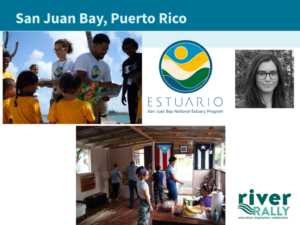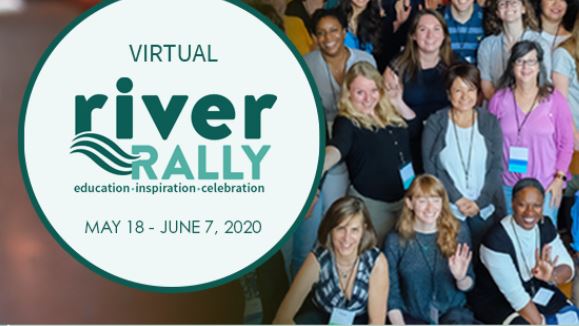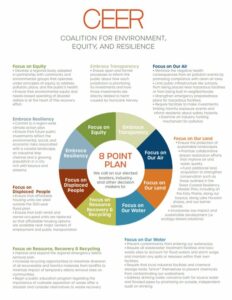Following the decision to move this year’s River Rally to a virtual event rather than cancelling it altogether, River Network staff and board, organizational partners, conference presenters and sponsors instead became a model for resilience under challenging circumstances. Determined to reach the many river protectors across the nation and working to keep the river connections flowing, River Network completely reorganized the conference as a virtual experiment. In times of adversity, it is this union of community that fosters resilience.
Many of our network members are facing questions about how to continue to do our work in physically distant ways (find resources here and here) as well as what our work on rivers looks like once we can meet and work together again. Many of us also realize that returning to what was “normal” will not bring resilience to our communities. Instead, organizations are focusing on creating a “new normal” that is more fair and just using tools like the Coalition for Environment, Equity and Resilience 8-Point Plan.
Two live sessions featuring members of the Urban Waters Learning Network (UWLN) during Week 1 of Virtual River Rally brought these ideas to the front and center: A Tale of Two Richmonds: Equity, Climate and History and A UWLN Peer Call: How are We Engaging Community Members and Building Leadership for Climate Resilience?
A Tale of Two Richmonds: Equity, Climate and History
Led by Rob Jones and Matt Holmes—executive directors from Groundwork Trusts in Richmond, VA and Richmond, CA—the live session took place on Wed., May 20 via Zoom during Virtual River Rally. The two hosts set the stage by giving an overview of environmental challenges in their cities, highlighting the racial inequities perpetuated throughout history. Each Richmond has participated in Groundwork USA’s Climate Safe Neighborhoods Initiative, which draws the connection between historic patterns of housing discrimination and climate impacts using historical maps and data to inform communities and create more equitable resilience plans to address flooding and extreme heat.
Learn more about the history of each Richmond in their individual Climate Safe Neighborhoods Story Maps: Richmond, VA and Richmond, CA.
Both Jones and Holmes reinforced the message that the first step to creating truly resilient communities that serve all people and their environments is learning about our histories and racial inequities and the ways in which they are still having an effect today. They then challenged workshop attendees to consider this information in their own regions.
To simulate small group discussion in the Zoom conference setting, the workshop facilitators assigned participants to break-out rooms to discuss questions about climate change, history, and race. In consideration of global to local impacts of climate change and how history influences climate vulnerability and resilience, one of the groups responded with:
“The structural history of racism and marginalization, income inequality, and environmental extraction has created disparities that amplify vulnerability to climate change for communities of color, immigrant communities, and low-income communities. Acknowledging and learning from that history and structurally redesigning our communities is central to climate resilience.”
In a second small group discussion, participants were asked to reflect upon historical inequities in their own communities and think about the kinds of data that are needed to support their work moving forward. Most understood the history of segregation, redlining, unequal distribution of polluting industries, and historic disinvestment, noting that redlining maps, documentation of local illnesses, and displacement data would help to make their resilience work more equitable.
Holmes was very clear that organizations cannot do this work without the communities that are most vulnerable. He repeated Groundwork Richmond’s key community engagement tenet : “Long listen, deep dive,” meaning, that organizations working in communities should first listen and support community needs rather than impose outside plans. This is the way to build trust in communities that have been neglected and/or subjected to empty promises in the past.
UWLN Peer Call: How are We Engaging Community Members and Building Leadership for Climate Resilience?
Facilitated by Heather Passchier (Rivers, Trails, and Conservation Assistance, National Park Service), the Urban Waters Learning Network hosted a Peer Call via Zoom conference on Thurs, May 21 during Virtual River Rally. The call highlighted five panelists from across the network: Maria Gabriela Huertas (Estuario), Andrew Kricun (U.S. Water Alliance), Cate Mingoya (Groundwork USA), Jonathan Phillips and John Evangelista (Groundwork Elizabeth). Each panelist shared insights and lessons from their work about centering community in resilience.

Maria Gabriela Huertas shared information about community resilience hubs in San Juan, PR as a way to effectively engage community members.
Similar messages about history and inequity permeated this rally session. And, the panelists and participants offered resources to access more information to do this work.
- Mapping Inequality: Redlining in New Deal America
- Urban Sustainability Directors Network: Resilience Hubs
- An Equitable Water Future: A National Briefing Paper
- UWLN Resources on Climate Education
- Resources for Bridging the Rural/Urban Divide
The UWLN also took the opportunity to introduce four new Urban Waters Issue Collaboratives: (1) Equitable Water Infrastructure, (2) Water Equity and Resilience, (3) Addressing Displacement Through Fair and Equitable Development, and (4) Environmental Justice Learning, Literacy, and Leadership. The collaboratives offer a chance for UWLN members and other practitioners to take a deeper dive into urban waters issues and equity along with your peers. They are designed to promote not only learning but also action. If you are interested in getting more involved in this work, please sign up to join or learn more about one of the new UWLN collaboratives HERE.
There were more sessions at Rally focused on resilience, specifically about community and civic engagement.
- Mobilizing Communities in Land and Water Work by Jill Erickson (Heartland Conservation Alliance) and Alicia Smith (Freshwater Future)
- Rooted in Nature: Achieving Equitable Resilience by Jordan Macha (Bayou City Waterkeeper) and Iris Gonzalez (Coalition for Environment, Equity, and Resilience)
Look for more information about those sessions coming soon on the network blog.
Change is Possible
As we all continue to adapt and work within the confines of COVID-19, one lesson is pervasive: we can adapt quickly when faced with a national emergency. River Network modeled this behavior by quickly turning River Rally into a virtual conference. State and local governments around the nation are acting swiftly to enact safety protocols and organizations are adapting their work. The longer the pandemic affects us, the more clear the realization is that there is no going back to “normal,” nor should we. As we continue our water work, practitioners can use the crisis to create a “new normal” that is more equitable and resilient for all communities.





Trackbacks/Pingbacks